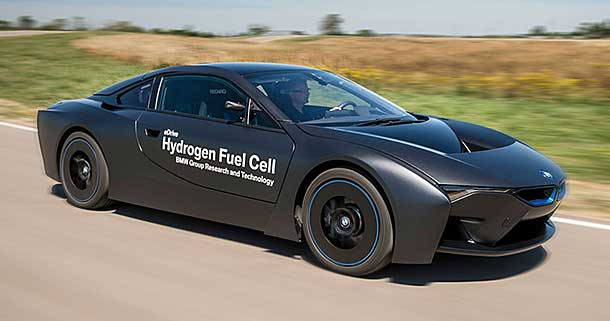
According to Merten Jung, BMW’s head of fuel cell development, in the future FCEVs (fuel cell electric vehicles) and BEVs (battery electric vehicles) will coexist and PHEVs (plug-in hybrid electric vehicles) will fade into the sunset. Mr. Jung believes that PHEVs are simply transitional technology until FCEVs and BEVs take hold in the market.
According to Mr. Jung, “Because a fuel cell drivetrain combines zero-emissions mobility with the fast refueling time that’s needed for long-distance driving. Moving forward, electric vehicles will have longer ranges thanks to advances in battery technology, but the refueling time won’t be competitive with that of a hydrogen-powered model. It takes about three to five minutes to top up a hydrogen tank, and then you’re set to go. We expect that battery-electric vehicles and fuel cell-electric vehicles will co-exist in the future, and plug-in hybrids are a simply a temporary solution until we get to that point.”
I mostly agree with this outlook with the exception that I believe PHEVs will be around for a long time, too. This is especially true when you consider the advantages of hydrogen fuel cell PHEVs.
H2 FC PHEVs offer the best of both battery and hydrogen technologies. Charging a vehicle overnight when electricity rates are low and then driving 30 miles to work on battery power alone is hard to beat. And when you need to drive over 30 miles, the range and refueling times of an FCEV are also hard to beat.
References
http://insideevs.com/bmw-exec-bevs-and-fcevs-will-co-exist-in-the-future-phevs-will-disappear/
http://www.digitaltrends.com/cars/bmw-is-preparing-for-a-hydrogen-future/#:QzggRNCPo_HPAA
Here in Rhode Island, residential electricity costs ~17 cents per kwh, and there are no discounts for off peak usage, so a family sized plug-in FCEV would cost ~5.7 cents per mile. If you achieve 68 miles per kg and hydrogen sells for $3.85 per kg (close to the predicted cost at a fully utilized large scale hydrogen station), then there would be no advantage to plugging in, and the money spent on the large plug-in battery would be wasted.
Apparently, electricity costs ~35 cents per kwh in Germany, so Merten Jung may have a similar thought process.
https://www.ovoenergy.com/guides/energy-guides/average-electricity-prices-kwh.html
I think the question is what is the source of electricity. WE have to be sure that the electricity we use must be produced with big zero emission of greenhouse gases. Here come the stationary hydrogen fuel cells which can produce electricity with BIG ZERO greenhouse emission.
Agreed! Green hydrogen is the way to go in order to reduce greenhouse emissions.